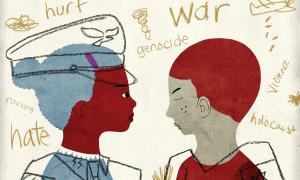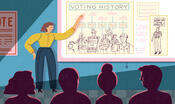the moment
FREEDOM TO LEARN NATIONAL DAY OF ACTION—MAY 3, 2023
“Because we know that attacks on knowledge are fueling threats to freedom, and that repression in one place fuels its spread elsewhere, we call for global resistance to all efforts to destroy the vital tools that help us to imagine and create more equitable and inclusive futures for us all.” —African American Policy Forum
- Freedom To Read, Freedom To Learn
- Debbie Reese on Book Bans and Native Representation
- ‘Never Again’ Starts With Education


